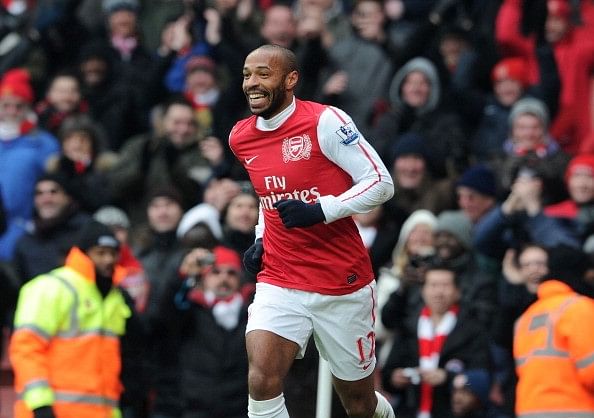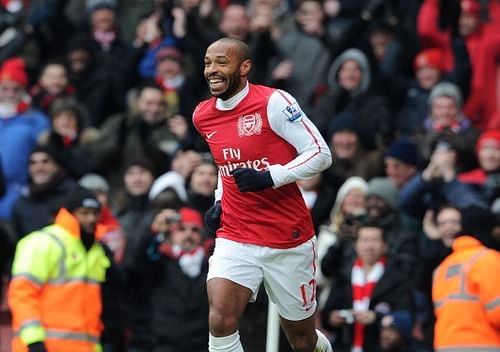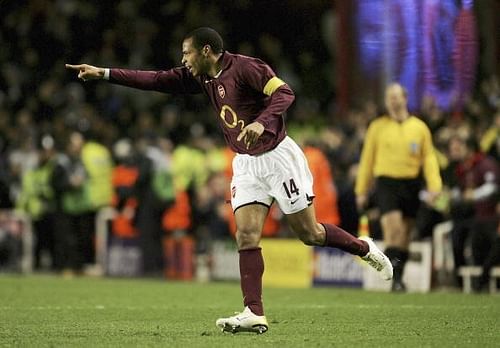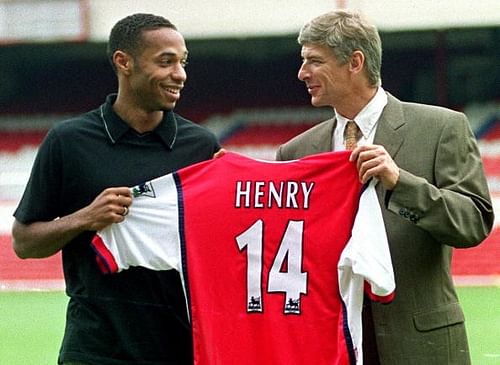
Why couldn't Juventus capitalise on Thierry Henry's obvious talents?
When one utters the name ‘King Henry’ to a person in England, chances are that the first two individuals that would come to mind would be the rulers of medieval Britain, the last of whom – Henry VIII, had six wives and was the architect of the Church of England.
However, if you’re a football fan, a Londoner, or a millennial - chances are that the name ‘King Henry’ would bring back memories of the mesmerising and graceful Arsenal striker who struck fear into the hearts of opposing defenders while managing to delight the hearts of his legions of fans. This outstanding individual is also more familiarly known as Thierry Henry.
The brilliant Frenchman holds the distinguished record of being Arsenal’s all-time top scorer with a ridiculous 228 goals as well as the top scorer for his country, finding the back of the net 51 times for France.
However, it could have all been totally different for Henry, who spent eight gruelling months with Italian giants Juventus, playing out of position on the wing, while earning the reputation of one of the most inconsistent wide men in Europe. Fortunately for Henry, the foresight of Arsene Wenger, who managed his compatriot at Monaco, prevailed and he was converted to a striker – and the rest, as they say, is history.
The mystery as to why couldn’t Juventus capitalise on Thierry Henry’s obvious talent continues even today.
Born in the suburb of Les Ulis, Henry initially showed little interest in football but was persuaded by his father to join local club CO Les Ulis – a breeding ground of French talent such as Patrice Evra, Yaya Sanogo, Anthony Martial, among others.
The Frenchman’s time at Les Ulis ended after six years in 1989, after which he played for a host of clubs before being spotted by Arnold Catalano – a scout for Monaco, then managed by Arsene Wenger. Henry was given his debut by Wenger on August 31, 1994, playing as a winger due to Wenger wanting to exploit the youngsters blistering pace against defenders, although he felt that his future lay as a striker.
Henry’s initial years at Monaco were promising albeit uninspiring, but things really picked up in his second season, at the end of which he was named the French Young Player of the Year. Things only got better from there, and Henry’s performances enabled them to lift the Ligue 1 title during the 1996-1997 season, as well as reach the semi-finals of the Champions League in the year after, with Henry scoring a record seven goals.
His performances for Monaco earned him a call-up to the national team and was a part of France’s World Cup winning squad in 1998. It took little time for the big clubs to take an interest in the youngster and was snapped up by Juventus in 1999 – which was when the problems started.
Now Henry was a born forward, who could singlehandedly create havoc for defences up front. Juventus brought him with the purpose of making him their main threat on the wing, which lead to lacklustre performances. The surprising part is that then Juventus manager Carlo Ancelotti, who is known for rotating players, didn’t have the foresight to switch Henry to the strikers role when it became clear that he wasn’t making the cut as a winger.
In fact, Ancelotti has gone on record by saying that his inability to recognize Henry as an out an out striker is one of the worst failures in his glittering managerial career. Henry was a player who could literally rip defences apart with his pace, and using him on the wing in a defensive minded league was counterproductive.
Henry wasn’t the beast he was back then, and would constantly run into a brick wall whenever he cut into the opposition’s box.
The Frenchman also spoke about the problems he faced with the Juventus hierarchy who are known for intervening when things don’t go their way. Nothing’s worse than a club’s board openly stating that they’ve lost faith in their player, but that’s exactly what Juventus did and were only too happy to cash in on him.
Henry finally arrived in London on January 3rd, 1999 after just six months with the Old Lady. Wenger, who tried to sign Henry in his first year in charge of Arsenal before Monaco sold him to Juventus, initially played him as a winger, before converting him into his famous striking role.
The Frenchman did struggle to adapt at first due to him having to learn the entire basics of striking once again, and took eight games to score his first goal, but once the goals started coming they never stopped.
Seven major titles with Arsenal followed, along with numerous individual awards including, Four Premier League Golden Boot awards, Two PFA Players’ Player of the Year awards, two European Golden Boot awards, among numerous others.
Why couldn't Juventus capitalise on Thierry Henry's obvious talents will forever come back to haunt them, just as Paul Pogba, who is a Juventus player, will always haunt Manchester United. Meanwhile, Henry’s glorious contributions to Arsenal is literally forever set in stone.


